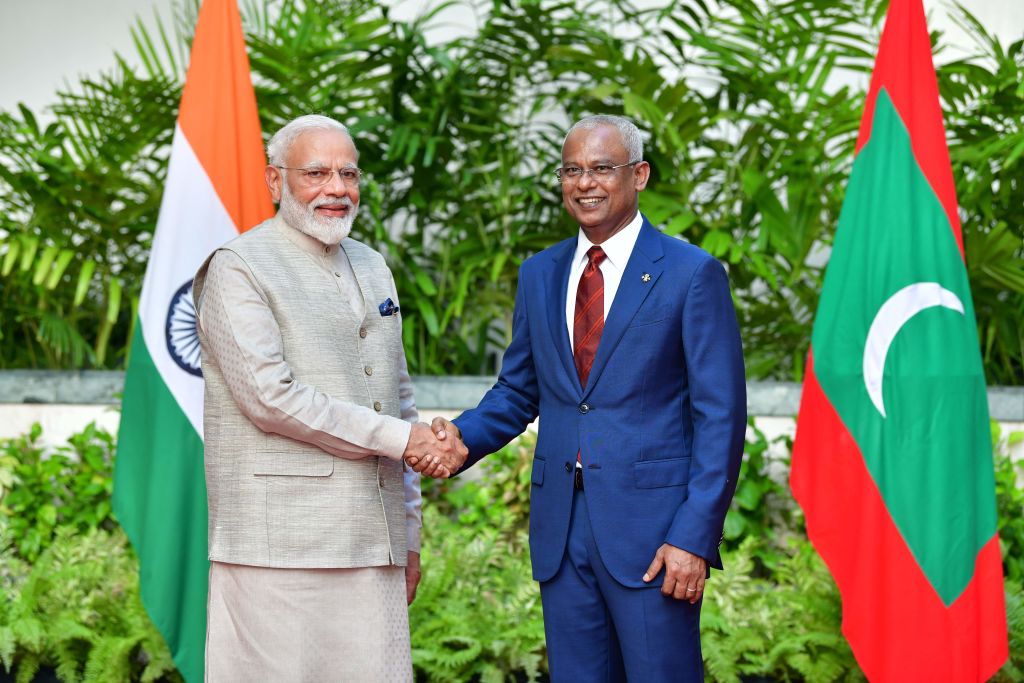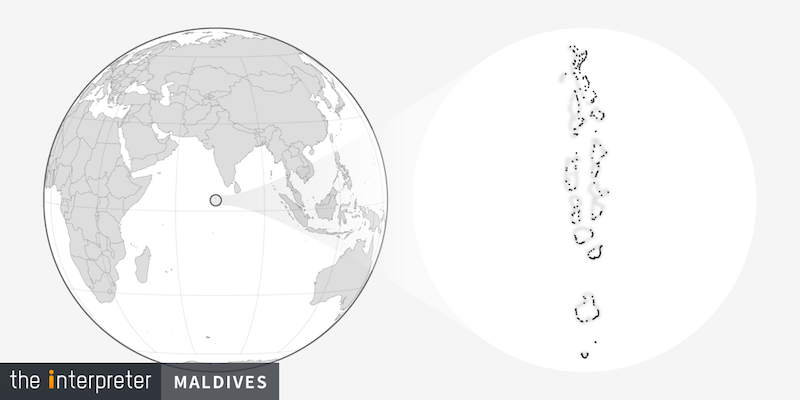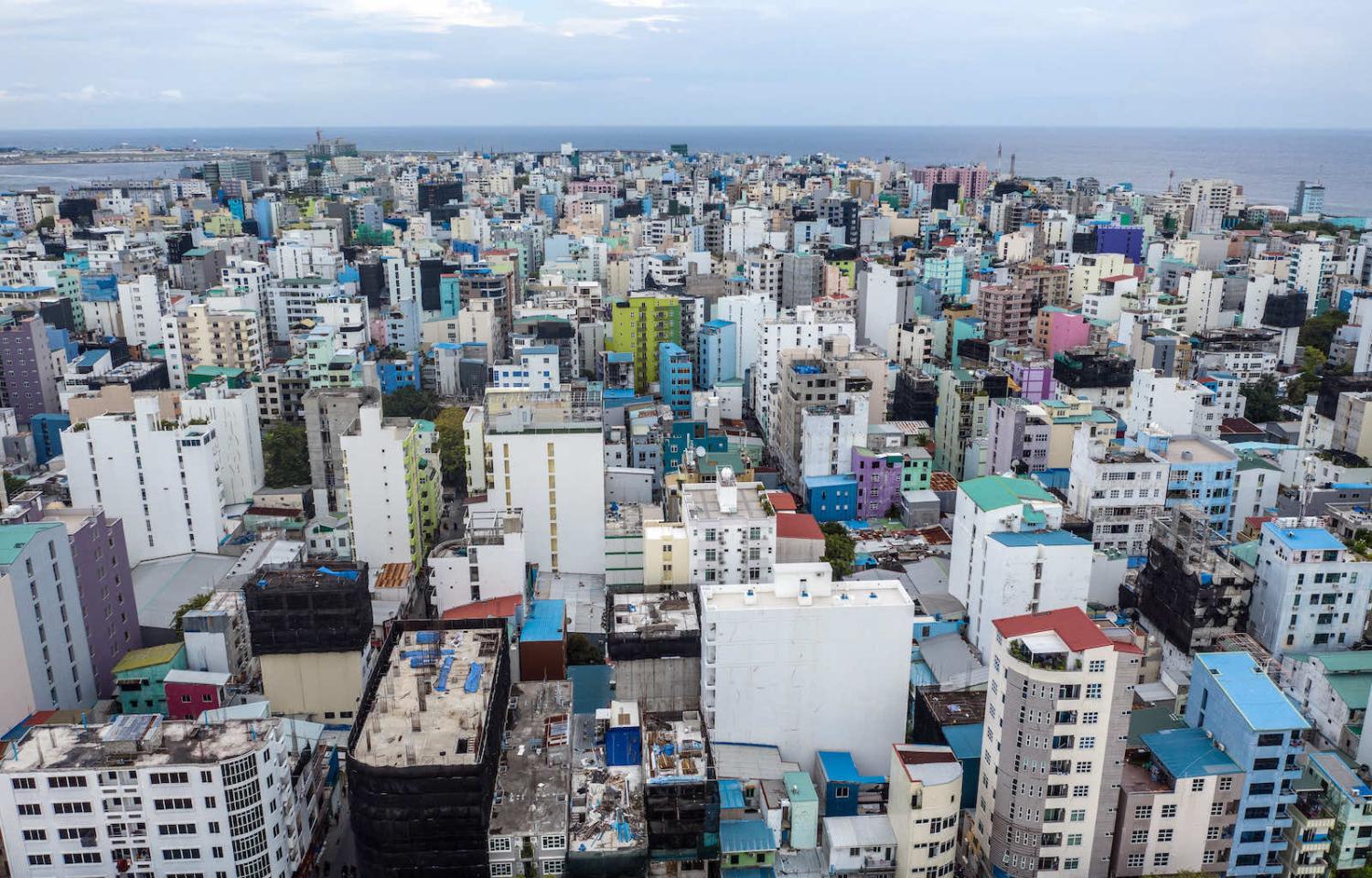Recent protests in Maldives against India’s influence in the country calling for “Indian military out” has led the Maldives government to respond by reiterating its “India First” policy. This has highlighted the difficulties that both countries face in building a stable strategic partnership while also addressing popular sensitivities. It’s not something that India has been good at elsewhere in the neighbourhood.
Maldives is a small island state located right in the centre of the Indian Ocean. Despite a population of only 500,000, its location, astride the main sea lanes of the Indian Ocean, gives it considerable strategic significance. For centuries big powers have sought to build influence there and deny its use to rivals.
Maldives has come to international attention in recent years as part of growing rivalry between India and China. The former president Abdulla Yameen, who was seen by many as dangerously close to China, was ousted in an electoral landslide in 2018. The new government under President Ibrahim Mohamed Solih proclaimed an “India First” policy, which is now being tested as he seeks to reconcile India’s growing presence against a tradition in Maldives of fierce independence.
The “India out” protests last month in the capital Malé shouldn’t be taken too seriously in themselves. They involved the usual crowd of Yameen supporters that regularly demonstrate in the streets for the release of the former president from house arrest (he was convicted of money laundering in 2019). The Maldives government responded sharply by describing India as the country’s “closest ally and trusted neighbour”. But protests also reflect widespread sensitivities among the Maldives community that do need to be addressed.
If nothing else, Solih’s “India First” policy reflects simple geographic reality. India has long been Maldives’ closest friend and protector. Indeed, many Indian analysts effectively see Maldives as part of an Indian sphere of influence in South Asia where rivals should not tread. More recently, India has taken a somewhat more positive approach in demonstrating its role as a “net security provider”, emphasising the benefits that it can provide to smaller countries.
But the relationship between one of the largest countries in the world and one of the smallest also inevitably brings sensitivities. India’s fragile ties with neighbours such as Bangladesh, Sri Lanka and Nepal show that these concerns are not always well handled.

Maldives people are realistic about their place in the world, but they are also proud of their independence and their centuries-long history as a country. Unlike much larger countries around the region, including India, they were never colonised by Britain. Instead, in 1887, Maldives Sultan Muhammad Mueenuddeen II saw the writing on the wall and offered a protectorate agreement with Britain in which Maldives could retain full political autonomy while deferring to London on foreign affairs.
This pragmatic decision meant that no British flag ever flew over Malé and no British governor or resident was ever installed in the capital. But in response to the Japanese threat in 1941, Britain was permitted to establish naval and air base at Addu Atoll in the far south of the archipelago.
Maldives’ pragmatism in working with big powers while also guarding its autonomy is key to understanding its approach to the world.
The failure to celebrate the help that the Indian military provides to Maldives communities may be a lost opportunity.
Since 2018, India has significantly stepped up its aid to Maldives in response to concerns about China’s growing influence under the previous government. This has included considerable fiscal support to help Maldives deal with its huge debts to China. A massive Indian-funded infrastructure project has been announced that would include new bridges linking the crowded capital to three neighbouring islands. There are also plans for India to help construct a new coast guard base near Malé.
New Delhi is also developing its presence in Addu in the south, including constructing a new police academy and plans to open an Indian consulate there.
One of the most controversial elements of India’s role involves contingents from the Indian Navy and Coast Guard in Addu as well as on islands in the centre and north of the country. They are there to maintain and operate a Dornier twin-engined aircraft and two helicopters, all under the direction Maldives National Defence Force, which does not operate its own aircraft.
Opposition leaders say that the presence of a foreign military undermines Maldives’ sovereignty. Indeed, in the last months of his rule in 2018, Yameen’s government tried to whip up nationalist sentiment by expelling the Indian contingents. They declined requests to leave.

Both the Maldives and Indian governments are tight-lipped about the arrangement out of concerns about nationalist sentiments. But this has created an information gap. Indeed, few Maldivians are aware of what they actually do.
It is in fact a good news story. The main role of the Indian-operated aircraft is to undertake medical evacuations from isolated communities on some 200 inhabited islands, most of which lack access to proper medical facilities – in some ways like Australia’s Flying Doctor Service. The aircraft are also tasked to patrol the waters of Maldives’ huge exclusive economic zone against foreign illegal fishing boats, a major political issue for a country that eats tuna for breakfast, lunch and dinner.
The failure to celebrate the help that the Indian military provides to Maldives communities may be a lost opportunity. Indeed, with the Indian presence in Maldives only likely to grow in coming years, a more active approach will be needed. History demonstrates that Maldives people can be pragmatic about the need to partner with big powers. But they also need to understand the benefits they get.
The author has recently returned from a lengthy assignment in Maldives with funding from the Australian Department of Foreign Affairs and Trade. This article is part of a two-year project being undertaken by the National Security College on the Indian Ocean, with the support of the Department of Defence.

